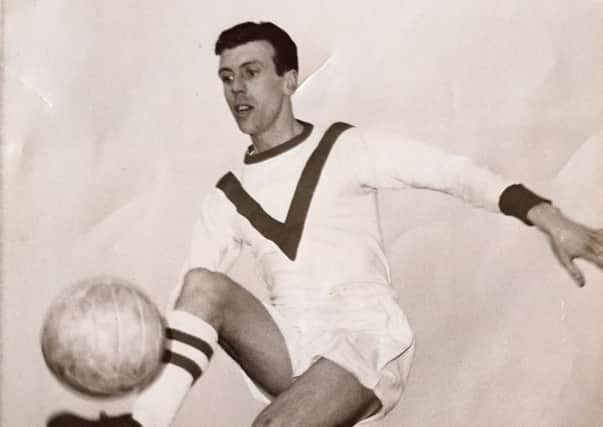Obituary: Jim Rowan, footballer and publican


Jim Rowan, who has died weeks short of his 80th birthday, enjoyed a notable football career during which he played more than 250 games between 1954 and 1970, mostly in the old 1st Division. His career was book-ended by spells at Celtic and Partick Thistle while in between he played for Stirling Albion, Clyde, Dunfermline Athletic, Airdrie and Falkirk. Self-mockingly, he once joked: “I may not have won many medals but I sure have some collection of club ties.”
As chairman of the Players’ Union in the late 1960s, he also made his mark off the pitch, promoting and protecting the interests of fellow players. In that capacity he was a colleague of Sir Alex Ferguson, then a Union committee member.
Advertisement
Hide AdAdvertisement
Hide AdOn the pitch he also had dealings with Sir Alex but of a less harmonious nature. Playing for Falkirk against Rangers in the late 60s, he was sent off for punching Ferguson, then of Rangers. At that time, the future knight had a reputation for “liberal” use of his elbows and the two had clashed at a corner kick.The SFA suspended Rowan for two weeks for this misdemeanour.
Celtic manager Jimmy McGrory was impressed by Rowan’s stylish play at inside forward for Shettleston Juniors and signed him in October 1952. The Bhoys were then about to enter a successful period, winning the Coronation Cup in 1953 and the League and Cup double in 1954, which made it difficult for youngsters like Rowan to break into the first team.
It was not till 18 December, 1954 that he made his first league appearance, against Dundee, scoring a goal in a 4-1 win, alongside teammates including Bobby Evans, Jock Stein, Charlie Tully and Bertie Peacock. A press report stated: “New boy Rowan showed up well in his first game and should do well with more confidence.”
Despite that auspicious start he only managed one more game, against Hearts, before being freed in 1956.
From Parkhead it was on to Clyde for three seasons, followed by a brief spell at Dunfermline before signing for Stirling Albion where he captained the team to the old 2nd Division title and was successfully converted from inside forward to wing half.
In 1962 he moved to Airdrie, where he had one of the most fulfilling spells of his career, playing almost 100 games in three years there and again captaining the side. Reports on him were complimentary: “Acquiring Rowan’s cultured football has been a good move by Airdrie. He has added poise, skill and confidence.”
In 1964 Aberdeen wanted to sign him but for family reasons he remained at Airdrie.
In 1965 he joined Falkirk where he would spend four years, latterly coaching the reserves and being interim manager after John Prentice left and prior to Willie Cunningham’s appointment.
Advertisement
Hide AdAdvertisement
Hide AdThat appointment led to some highly publicised rancour as Cunningham abruptly stripped Rowan of his coaching duties. When he complained to a journalist about this treatment, Cunningham responded by suspending him for 14 days for being in breach of contract by “taking part in journalism”.
Rowan appealed successfully to the SFA, which ruled that speaking to a journalist did not constitute “taking part in journalism”.
But that meant his days at Brockville were numbered and he made his final move to Partick Thistle, where he was player/coach till summer 1970 when he retired from playing. The dispute with Falkirk fired his interest in football politics leading to his becoming chairman of the Players’ Union.
Having had some coaching experience and armed with the top student award from the SFA coaching course at Largs, he was keen to try management. In 1970 he became manager at East Stirling but it did not work out and after a year he and the club parted company.
Three years later Alex Ferguson would cut his managerial teeth there.
He then scouted for Celtic for a spell before coaching at Clyde till 1975 when he left the game.
Jim Rowan was born and raised in Bridgeton, where he attended St Mungo’s Academy. He was mostly a part-time player who worked initially as a toolmaker and latterly for a finance company. When he left football he built up a successful publican’s business, particularly with the Horseshoe Bar in Airdrie till 1990 when he took early retirement.
This enabled him to spend more time with his family, to whom he was devoted, enjoying visits to Australia and Canada to see daughters who had settled there. He also enjoyed playing golf at Bothwell Castle Golf Club, where he was a member.
Advertisement
Hide AdAdvertisement
Hide AdGrandson Colin Devine described him as “a kind and gentle man who loved his football. Watching games on television, he was constantly analysing the play.”
Former Celtic star John Hughes, a good friend, commented: “Jim was a lovely man, very caring and very helpful. He and his wife Nan made a smashing couple. Despite the brevity of his Celtic career, he remained a very big Celtic fan and used to say to me if he was in the house when an Old Firm game was on TV, he had to go out for a walk as he couldn’t bear the tension!
“Also Jim was quite a religious man, involved with his church, St John’s in Uddingston, where he lived, and the St Vincent de Paul Society charity.”
Jim Rowan died in Monklands Hospital after a short stay there. He is survived by his wife Nan, daughters Elaine, Geraldine, Anne and Pauline, and several grandchildren.